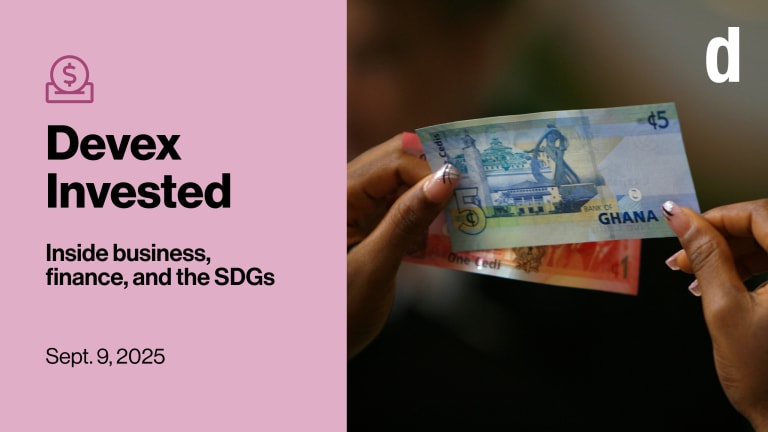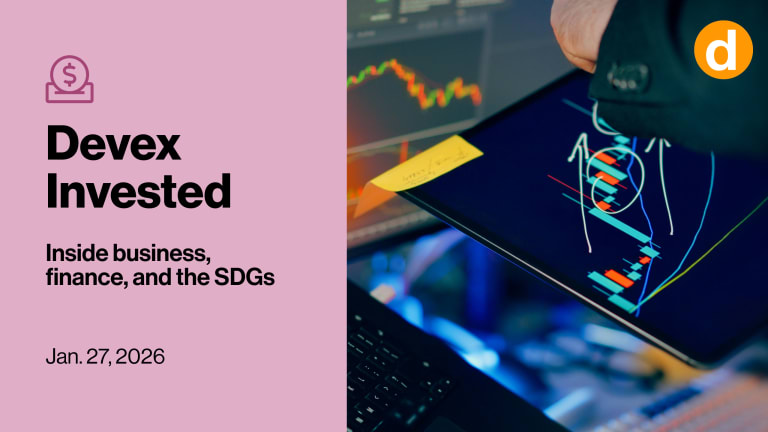
A long-awaited report on financial inclusion from the World Bank has a slew of good news — a rarity in these days of grim economic prognostications.
The Global Findex Database 2021 — the first new edition in four years — shows significant improvement in ownership of bank and mobile money accounts. In low- and middle-income countries, 71% of adults now have accounts, up from 51% a decade ago. The gap between men and women narrowed to 6 percentage points in these nations, down from 9 in 2017.
This is a preview of Devex Invested
Sign up to this weekly newsletter inside business, finance, and the SDGs, in your inbox every Tuesday.
• A big trend line is that people are actively using their accounts for payments and not merely to receive cash. I reached out to Michael Schlein, who leads Accion, a nonprofit fintech impact-investing group. In short, he hails the report’s results as “enormous progress.”
• “This is a once-in-a-lifetime moment where if we do this right, we can emerge from the pandemic and accelerate the creation of a financially inclusive world,” says Schlein, whose organization has invested in companies across Africa, Asia, and Latin America that drive access to banking, lending, microinsurance, and digitization of small business operations.
• So how has Accion’s portfolio changed? “If you looked at our portfolio a few years ago, you would have seen two ag-tech companies and a few insurtech companies. And in the last three, four, five years, you're seeing really great innovation that is very specifically aimed at remote farmers. So I'm actually pretty excited about our ability to reach them,” Schlein says.
• A remaining challenge is that many of the unbanked people, including women, are the ones who are hardest to reach — a result of the so-called last-mile problem.
• Mahesh Uttamchandani, a World Bank expert on financial inclusion, tells me he sees significant opportunities for private sector investors to innovate and reach women in particular. The bank will also step up work on financial literacy, as well as consumer protection in low- and middle-income countries, to reduce risks like scams, fraud, and unsustainable personal debt, he says.
But will the global economic headwinds, including inflation, unwind progress on financial inclusion? Uttamchandani optimistically sees the opposite happening. “Increased access to financial services actually increases people’s resilience,” he says.
Recap: How can technology help close the gender gap in financial inclusion?
Plus: Spike in fraud may hurt Africa's gains in digital financial inclusion
Staving off the next pandemic
A key lesson that many policymakers took from the COVID-19 crisis is just how unprepared countries were, especially lower-income nations. Last week, the World Bank board voted to create a new and “ambitious” pandemic prevention and preparedness fund. The bank and the World Health Organization estimate a $10.5 billion spending gap in this area annually, though, currently, the fund only has a little over $1 billion in pledges, mostly from the U.S. and Europe.
The financial intermediary fund is a model that pools private and public funds. Governments will now have to come up with proposals and work with implementing partners to access the capital. The bank hopes that as success stories emerge, more donors will step up. “Success breeds success,” says Mamta Murthi, a World Bank vice president.
Read: World Bank approves creation of ‘ambitious’ pandemic preparedness fund
DevExplains: How a new global preparedness fund at the World Bank will work
The case for climate
Speaking of more money, the private sector wing of the Inter-American Development Bank is building a case for a capital increase. IDB Invest CEO James Scriven tells my colleague Adva Saldinger that he is “on the cusp of a new business model,” but that the project will stall without more money.
While he is coy about the exact amount he is seeking, Scriven says he wants to invest more in climate change and gender diversity, while crowding in more funds from the private sector. He notes a shift on the climate front, saying IDB Invest no longer needs to convince clients that responding to climate change is good for their business. Instead, he sees his role as helping companies figure out how to make reforms.
Read: IDB Invest CEO on capital increase, climate priorities
Join us at Devex World
Tickets are still available for our flagship event, Devex World, coming up on July 12 in person in Washington, D.C, as well as online. As one of the event’s impressive lineup of development luminaries, we will interview IMF Managing Director Kristalina Georgieva about ways to stabilize an increasingly uncertain world. Plus, you’ll hear discussions with IFC chief Makhtar Diop and British International Investment head Nick O’Donohoe, as well as the latest on climate and humanitarian finance.
+ Devex Pro members can get a free ticket to join the enhanced virtual experience from anywhere in the world. Not gone Pro yet? Sign up today and start a 15-day free trial.
The future of green energy
As companies and countries look to diversify their energy sources and use more renewables, the next generation of suppliers will be found in low- and middle-income countries, says Guy Platten, an expert in the maritime industry.
The development finance community should play a catalytic role in tackling existing hurdles and building necessary infrastructure to help those nations position themselves as global leaders of green fuels, Platten writes in an op-ed for Devex.
Opinion: Green energy investors, look to the global south
And don’t miss: A fund to supercharge USAID’s global health equity work
What we’re reading
The role of DFIs in renewable energy transitions in a period of debt distress in southern Africa. [Boston University]
IMF Staffers, in an internal survey, complain of “undue influence,” as the financial institution pledges safeguards. [Devex]
Ghana becomes the latest country to ask for IMF support, as economic headwinds pick up pace. [Bloomberg]
Emerging markets are facing the worst crisis in decades, says former money manager Jay Newman. [Bloomberg]
Adva Saldinger contributed to this edition of Devex Invested.









